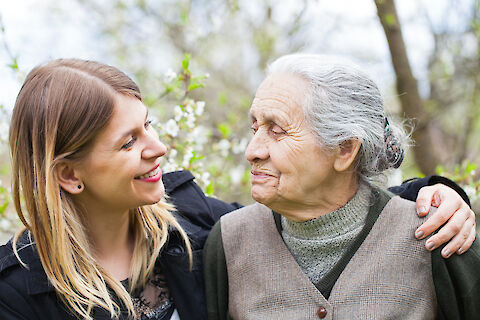
Caring for a loved one with Alzheimer's is sometimes challenging and emotional. Whether you are new to caregiving or your senior relative has been recently diagnosed, understanding the basics of Alzheimer's is crucial to providing the best care possible. This Senior Helpers guide aims to help you navigate this often complex disease so your loved one receives the care, patience, and compassion they deserve.
Overview of Alzheimer's Disease
Alzheimer's is a progressive neurological disorder affecting memory, thinking, and behavior. It is the most common cause of dementia, accounting for 60-80% of all cases. Currently, more than 5 million Americans are living with Alzheimer's. This number is expected to rise as the population ages. Although the exact cause of Alzheimer's is still unknown, age and genetics are considered significant risk factors. Early detection and diagnosis are key as they allow for improved management of the disease and better quality of life for those affected.
Symptoms and Stages of Alzheimer's
Alzheimer's disease progresses through three primary stages: early, middle, and late. Each stage is characterized by specific symptoms and challenges that caregivers should be aware of as they support their loved ones.
In the early stage of Alzheimer's, the most common symptom is memory loss, especially forgetting recently learned information. Seniors may also face difficulty in planning or solving problems. They may struggle to complete daily tasks and experience changes in mood and personality.
Memory loss and confusion worsen as the disease advances to the middle stage. Seniors might find it difficult to recognize familiar people and places. Sleep disturbances may occur, and they may struggle with expressing themselves through speech or writing.
The late stage of Alzheimer's is marked by severe memory loss, where individuals may not recognize family members or even themselves. They lose the ability to communicate effectively. Seniors in this stage eventually become dependent on others for physical care like dressing, bathing, and eating.
Caregiving for Someone with Alzheimer's
Your role and responsibilities as a caregiver for someone with Alzheimer's will evolve alongside the progression of the disease. In the early stage, it is important to encourage your loved one's independence by allowing them to participate in daily tasks and decisions. Establishing a routine and providing emotional support help manage the initial symptoms of memory loss and mood changes.
Safety becomes a top priority during the middle stage as confusion and disorientation increase. Assist with daily tasks as needed and ensure the living environment is secure and easy to navigate. This stage may also require caregivers to manage behavioral symptoms such as agitation, anxiety, and wandering.
The focus shifts to providing physical care and ensuring comfort and dignity for your loved one in the late stage. Managing pain, preventing infections, and addressing any other health concerns become critical components of caregiving. Preparing for end-of-life care and discussing your loved one's preferences with their healthcare team is essential during this stage.
Additional Resources and Support for Caregivers
Being a caregiver for someone with Alzheimer's can be an isolating and overwhelming experience. Connecting with support groups, accessing educational materials, and seeking respite care services when needed can make it easier. It is smart to network with other caregivers who are experiencing similar challenges. They can offer valuable advice, emotional support, and a sense of community.
Senior Helpers Can Provide Alzheimer's Care
Senior Helpers offers quality, in-home care tailored to our senior community's individual needs. The team of professionals at Senior Helpers San Mateo is here to support you and your loved one through every stage of this journey. If you live in San Mateo, Redwood City, Burlingame, or Millbrae, and require assistance with Alzheimer's caregiving, do not hesitate to contact us today.